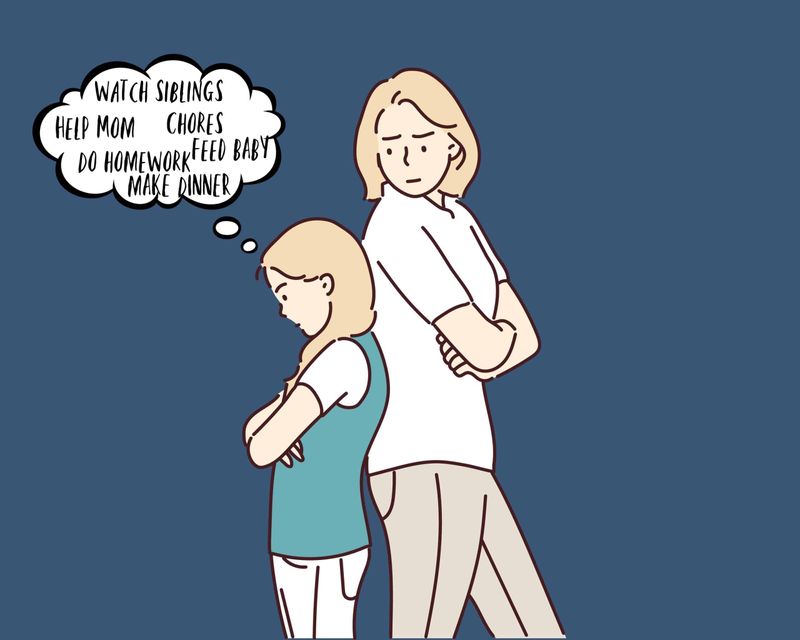Here’s the brutal truth no one likes to say out loud: Some of us didn’t get to be just kids. We were the emotional regulators, the peacekeepers, the unpaid therapists, the second parents. We weren’t mothered—we mothered.
And while it made us strong? It also made us tired, hyper-independent, and sometimes unsure of what love is supposed to feel like.
Se vi siete mai chiesti why your adult relationships feel confusing, exhausting, or one-sided, you might’ve grown up parentified—forced to take on adult roles way before you ever signed up for them. Let’s talk about what that actually looks like.
1. Tiny Shoulders, Big Feelings: You Were Responsible for Your Parent’s Emotions
Ever been the kid who passed the tissues to your mom or tiptoed on eggshells when Dad was in a mood? That weight didn’t just build empathy; it made you feel like everyone’s emotional well-being was your job, even before you had multiplication tables down.
You learned to read the room before you read bedtime stories, always on alert for the next emotional storm. The hardest part? You still catch yourself calming people down when you’re the one who needs comfort.
This superpower isn’t always a blessing. Sometimes, it’s exhausting. It can leave you tangled up in other people’s feelings and unsure when you’re allowed to have your own.
2. Gold Star for Grown-Up: Praised for Being “So Mature”
Remember all those compliments about how together you were? “So mature for your age!” they’d say, while you secretly wished you could just be silly and loud. People celebrated your composure, never realizing it meant you had no space to be a real kid.
You got applause for keeping it together when you really wanted someone else to take the wheel for once. Your messiness, your tears, your big feelings—all quietly packed away.
Now, adult you sometimes feels guilty for needing help or being less than perfect. The echo of being “the strong one” is hard to shake, even when you desperately want to fall apart.
3. Chronic People-Pleaser: Putting Others First No Matter What
You’re the queen of saying yes, even when you’re running on fumes. Your childhood was a crash course in self-sacrifice, so now, giving too much just feels normal. You probably believe love equals self-abandonment, even when it leaves you feeling invisible.
Growing up, you’d set aside your own hunger, tiredness, or dreams because someone needed you. Old habits die hard, and people-pleasing is the hardest of them all.
Adult relationships test this reflex over and over. You catch yourself caring for others but struggle to identify what you want. It’s a tough cycle to break, especially when “being needed” has always been your main source of validation.
4. The Helper Who Never Asks: Struggling to Ask for Support
Being the family helper meant you rarely got to be the one who needed anything. You learned early that asking for help might annoy someone or, worse, get ignored. Now, adulthood feels like a solo mission—even when you’re surrounded by people.
You’d rather chew glass than be labeled “needy.” The idea of leaning on someone? Terrifying. Vulnerability feels risky because you never got the memo that your needs matter too.
This self-reliance can look impressive from the outside, but inside, it’s lonely. Letting people in feels strange, but learning how is the bravest thing you’ll ever do.
5. The Invisible One: Second-Guessing Your Needs and Boundaries
You probably became a pro at figuring out what others wanted—at the cost of knowing your own limits. As a kid, your needs were ignored or treated like a hassle, so you stopped voicing them at all.
Fast forward, and now you hesitate before speaking up, even in safe relationships. You wonder if you’re asking for too much or if you’re just “making a fuss.”
Boundaries feel foreign, even dangerous. Saying no sends your anxiety into orbit, and you second-guess yourself every step of the way. But deep down, you know your needs deserve to take up space.
6. The Guilt Magnet: Feeling Bad for Saying No
That stomach-drop feeling hits every time you refuse a favor. As a kid, disappointing someone was a recipe for chaos. So you learned to avoid it at all costs—even your own well-being.
Now, guilt is your shadow. Saying no feels like failing some invisible test, even when you know it’s the right thing.
The urge to keep everyone happy is strong, but it leaves you drained and resentful. It’s not selfish to set limits, but rewiring your reflex to please takes patience—and a lot of self-compassion.
7. Broken Wing Syndrome: Attracting People Who Need Saving
You have a sixth sense for spotting people who need rescuing. Relationships feel most familiar when you’re fixing someone—because that’s what love looked like growing up. It’s not that you want to be anyone’s therapist, but you can’t ignore someone else’s pain.
It’s a recipe for burnout. You end up with partners who depend on you but rarely return the care.
Your heart is gold, but it’s tired. Healthy love isn’t about saving someone from themselves. You deserve a relationship where support goes both ways, not just one.
8. Peace Is Weird: Feeling at Home in Chaos
When you grew up in unpredictability, peace just feels…odd. You’re used to scanning for trouble, ready to jump into action.
Calm spaces make you restless, like you’re missing something important. Relationships that are soothing may seem boring or suspicious, as if the real drama is lurking just out of sight.
Learning to trust calm takes practice. It’s okay if it feels weird at first—your nervous system is just catching up to a new normal.
9. Chief Apologizer: Over-Explaining and Over-Functioning
If “I’m sorry” was your catchphrase as a kid, it’s no wonder you can’t stop apologizing now. You explain every decision, double-check every plan, and try to fix things that aren’t yours to fix.
This habit started as damage control. Keeping the peace meant making sure your presence was never too much trouble.
Now, over-functioning is your autopilot setting. Catch yourself owning stuff that isn’t yours? Be gentle. You were wired this way, but you can rewrite the script.
10. Too Much and Not Enough: Feeling Inadequate and Overwhelming Simultaneously
You know that feeling when you’re both “too much” and “not enough”—sometimes on the same day? It’s the result of growing up trying to shrink to fit someone else’s comfort, then stretching to be whoever they needed.
Now, you struggle to feel whole. You question if you’re lovable just by being you, not by what you do for others.
It’s exhausting, but you’re allowed to take up space. You don’t have to edit yourself for anyone’s approval anymore.
11. Queen of Control: Equating Control with Security
When life was unpredictable, you became the one with a plan. Control was your shield—if you could keep everything together, maybe nothing would fall apart.
Now, letting go feels risky. You micromanage relationships, projects, even your own emotions to keep chaos at bay.
Control can be comforting, but it can also keep you stuck. Learning to trust others—and yourself—takes time, but it’s worth every shaky step.
12. Love Means Sacrifice: Struggling to Believe in Easy Love
If your experience of love was about giving everything, you might not trust love that doesn’t require sacrifice. You expect to give more than you get, thinking that’s just how it works.
But real love isn’t a transaction. You’re allowed to be cared for without paying a price.
Letting yourself receive can be vulnerable, but there’s freedom in knowing love doesn’t have to mean exhaustion.
13. Desire? What’s That?: Difficulty Identifying Your Own Wants
You’ve spent so long reading other people’s minds that when someone asks what you want, you freeze. Even choosing dinner can feel like a pop quiz.
Your childhood trained you to anticipate others’ desires, so your own got buried. Now, tuning into your own wishes takes work.
It’s not selfish to have preferences. Learning to listen to your own voice is a big win—even when the answer is “I don’t know yet.”
14. Sorry for Existing: Apologizing for Your Own Emotions
You learned early that emotions made life harder for everyone else. Tears, anger, even excitement felt like burdens you shouldn’t share.
Now, you apologize for feeling anything at all—even when nobody’s upset. Crying alone becomes a routine so you don’t “make things harder.”
Your feelings are valid, even if they’re messy. You’re not “too much” for anyone worth having in your life.
15. Bracing for Goodbye: Expecting Rejection Even When Loved
Somewhere deep down, you’re always waiting for love to vanish—no matter how steady it feels. Childhood taught you that care was conditional, so you keep an eye out for signs you’re about to be left behind.
Even in healthy relationships, you struggle to trust that love sticks around when you need it most.
The fear of losing people can make you hold back or overcompensate. But you’re worthy of steady, unconditional care. You really are.
16. The Over-Performer: Over-Functioning to Avoid Being “Too Needy”
In your mind, being “low-maintenance” is safer than being needy. You try to do it all—juggle work, family, friends—so no one can accuse you of asking for too much.
Your value feels tied to performance rather than just being yourself. The exhaustion is real, but you keep going so nobody can say you don’t pull your weight.
Chances are, you give way more than you get. Being “easy” shouldn’t mean being invisible.
17. Caretaking Is Home: Feeling Safest When Taking Care of Others
Being a caretaker gave you a sense of purpose—sometimes the only one you had growing up. You were the fixer, the nurse, the emotional anchor.
Taking care of others still feels comforting, but it can keep you stuck in old wounds. You give and give, hoping it’ll buy you a place in someone’s heart.
The truth? You don’t have to earn connection by caretaking. You matter even when you’re not holding everything together.
18. Useful or Useless: Self-Worth Tied to Being Needed
When helping is your identity, being “extra” or unnecessary can feel terrifying. You worry you’re only lovable when you’re useful—so you jump in, organize, and problem-solve even when no one asked.
Without constant tasks, you feel anxious or lost. Your value isn’t in what you give, but it’s hard to believe that sometimes.
It takes time to separate your self-worth from your usefulness, but you are so much more than your to-do list.
19. Running on Empty: Exhausted and Unsure How to Rest
Rest feels like a foreign language. Your brain never got the memo that it’s okay to stop hustling. Stillness feels like neglecting an emergency you can’t see but always sense.
Even vacations or quiet evenings bring guilt. You secretly believe you’re slacking off unless you’re being productive or available.
Learning to rest is a skill you’re still building. Being gentle with yourself matters just as much as being there for everyone else.




















